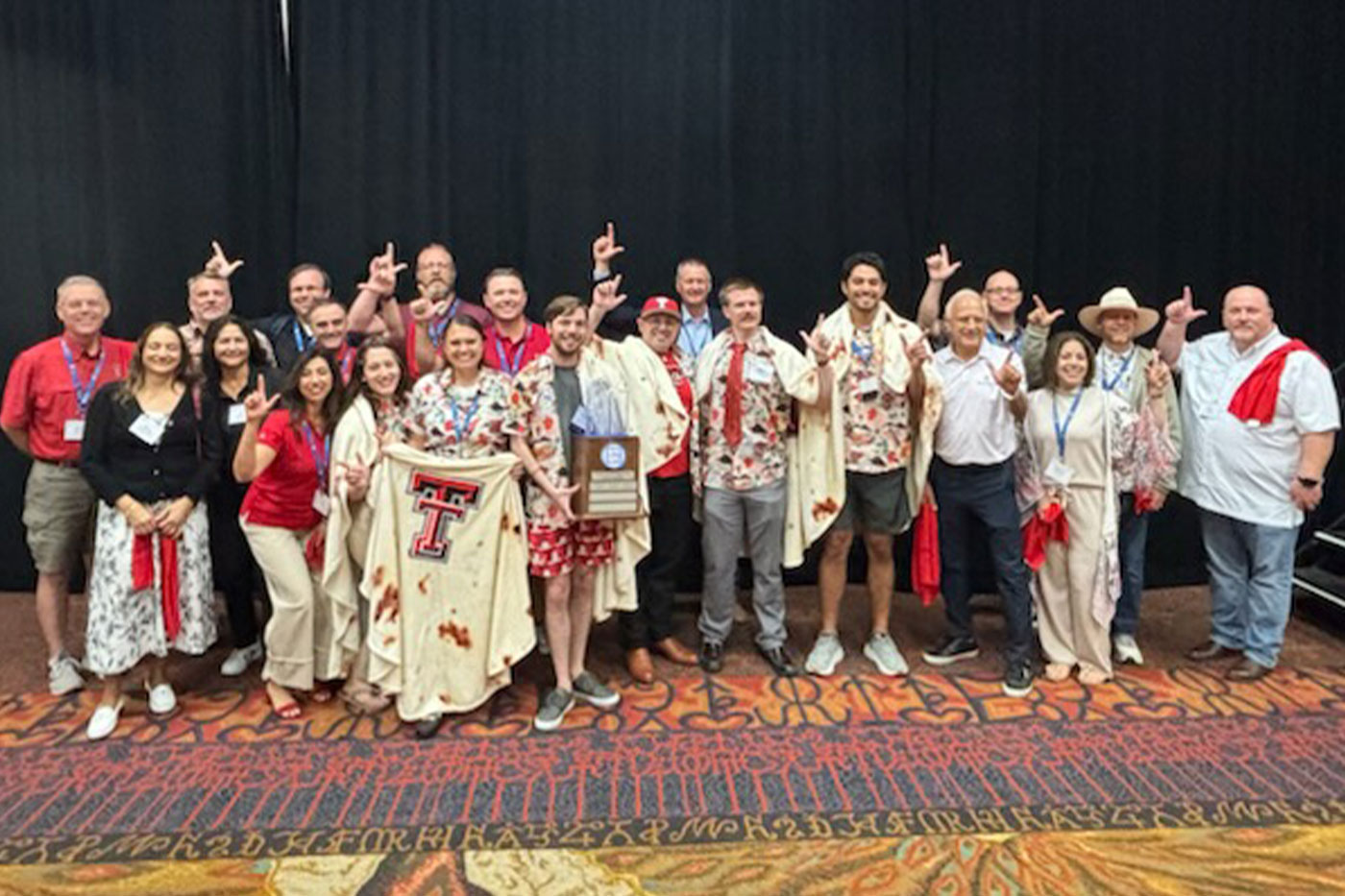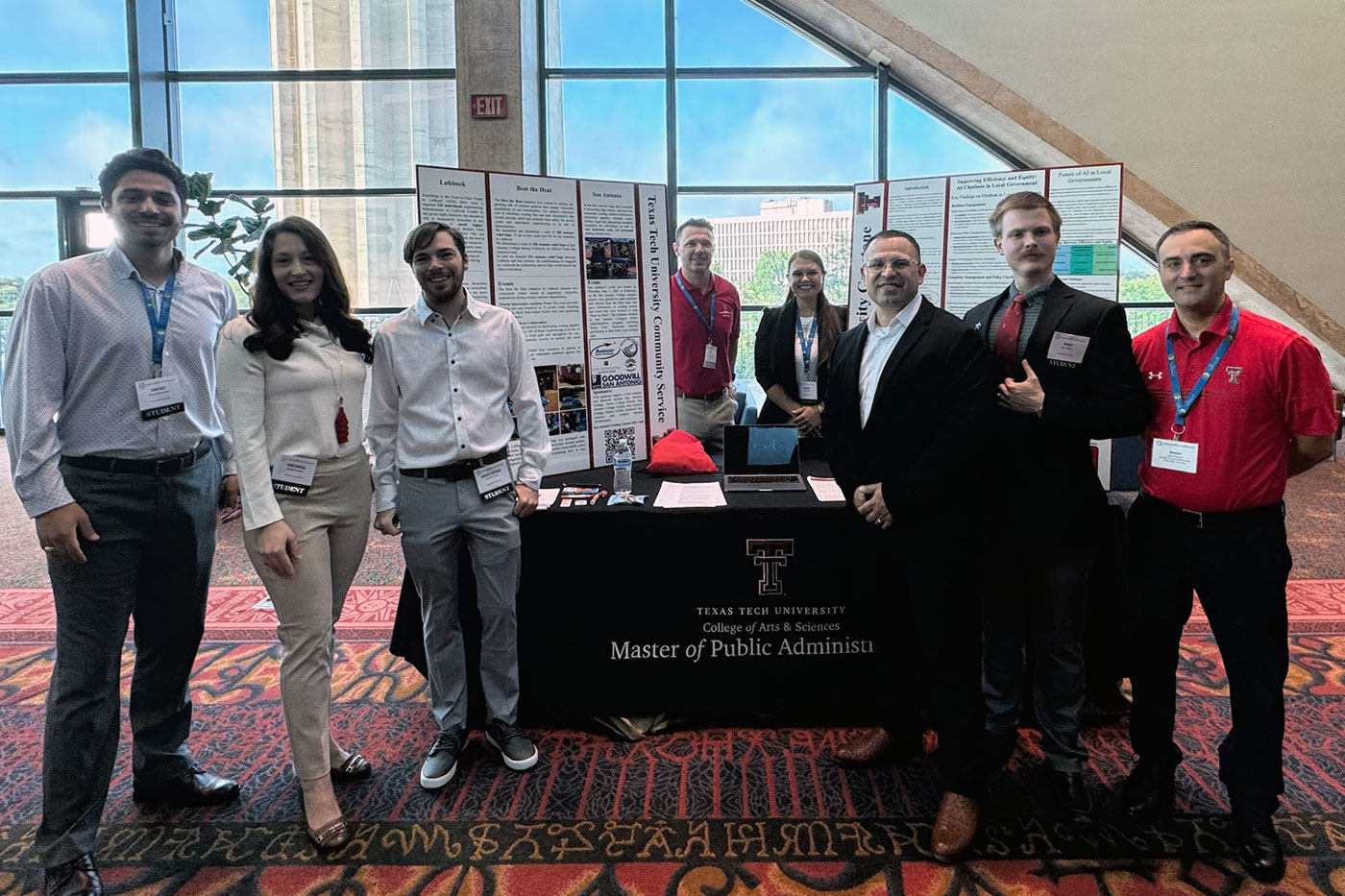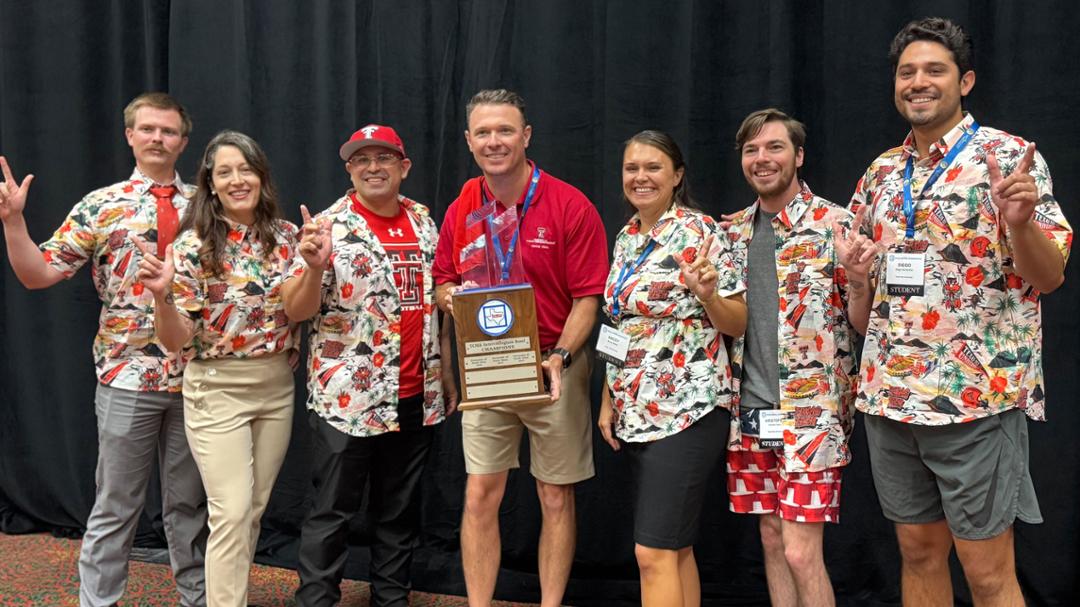Representing the Master of Public Administration program, six students beat out several Texas schools and established themselves as future community leaders to know.
(Header Photo: MPA students Max Fisher, Virginia Finster, Christopher Garza, Kacey Galata, Kristofer Swan and Diego Hernandez pose with coach Jeffrey Snyder (center) and the Intercollegiate Bowl trophy.)
Public administration is often a thankless job, and one that usually receives significant attention only when something goes wrong.
Fortunately, whoever hires the six winners of Texas City Management Association’s 2025 Intercollegiate Bowl (ICB) will immediately see passion for public service. The students in the Master of Public Administration (MPA) program at Texas Tech University demonstrated genuine care for community that constitutes proper governance by committing long hours and considerable analysis.
Completing a community service project focused on staying prepared for hot summer weather and a research-heavy capstone project analyzing the compatibility of artificial intelligence (AI) with local governments was key to securing the victory.
Returning from San Antonio with the trophy was the culmination of a substantial effort on the part of Daniel Scheller, associate professor of public administration and MPA program director, Jeffrey Snyder, coach of the ICB team, and MPA students Virginia Finster, Max Fisher, Kacey Galata, Christopher Garza, Diego Hernandez and Kristofer Swan.
The MPA program has established a favorable reputation for the number of alumni it has produced currently in city management across Texas, many of whom attend the annual Texas City Management Association (TCMA) conference in June where the ICB champion is crowned. Scheller, who arrived at Texas Tech in fall 2023, was quickly spurred by former Red Raiders to assemble a winning operation that matched the program’s proficiency.
“One of the first things they mentioned as I came on as director was they wanted us to have a team,” he recalled. “They said, ‘There’s no reason why we can’t win a competition.’”
Earlier that year, Virginia Finster had traveled to Allen as part of a small group of three, which hampered their chances of winning. Had there been a couple more students, Texas Tech would’ve been able to complete the capstone and community service projects – the largest portions of the ICB – and likely would’ve won, Finster realized.
After mentioning this and suggesting the creation of a class for the competition to Scheller, she was pleasantly surprised by the support she received from him and others in the Department of Political Science.
“I've been in plenty of rooms where you recommend things, and people don't take those recommendations,” Finster said. “But the administrators listened, and then they put the time, money and resources behind that initiative to see it come to fruition.”
Scheller spent over a year determining the logistics of finding students, forming a full-fledged team and getting them to and from the three-day conference. In fall 2024, students were requested to submit their interest in joining and write a short paper documenting their motivations and career aspirations, which were judged by a panel of alumni and local government officials.
Having the team selected by the same type of people who would be judging the team at the ICB made for a distinct advantage, Scheller said.
He brought in alumnus Jeffrey Snyder, former city manager of Plainview, Texas, and current assistant director of the Texas Municipal League Intergovernmental Risk Pool, an insurer for local governments. Snyder led the special topics course, guiding the students through practical applications to city government that comprised the various projects they needed to complete for the ICB.
Finster took on the community service project, Max Fisher was assigned the capstone project and the other teammates contributed to the rest of the competitions by utilizing their own specific passions and skills.
With Finster, Galata and Hernandez based in San Antonio, and the rest of the group in Lubbock, Finster sought to implement a project applicable to both locations, landing on a “beat the heat” program.
They sought to raise awareness of public service announcements advising people to apply sunscreen, seek access to cooling centers and stay hydrated, in addition to providing supplemental information and items.
Through various nonprofit organizations, the Lubbock cohort distributed roughly 260 “beat the heat” bags. As for Finster, who also works at San Antonio College, she handed out 250 bags at a music festival sponsored by the college’s radio, television and film program.
The subject of AI for Fisher’s capstone project, initially proposed by Snyder, found favor with Fisher as he further investigated its potential to drive efficiency and act as an extra staffer for small municipalities.
Through his research, Fisher presented AI chatbots as a tool for enhancing performance and equity in the public service sector. Though not without its faults, he discovered AI’s capability to detect fraud through data analysis and summarize and translate information for civilian audiences.
Fisher harped on the significance of making information digestible for people outside of government buildings, in the interest of combatting misinformation and dispelling the notion that politics are only for elected officials.
“You have a voice, you have a vote, and informing yourself is very important,” he said. “So, what can we do as people who are providing these documents, programs and policies to make sure you understand what we’re doing and why we’re doing it?”

On June 21, the Texas Tech team gathered within the Henry B. Gonzalez Convention Center for the final event of the ICB: the quiz bowl. The Red Raiders faced off against several Texas public administration programs, chief among them the three-time champions from the University of North Texas.
Texas Tech held a slim eight-point lead before the last competition, Fisher recalled, enough to where they didn’t need to win the quiz bowl but had to do well. The quiz bowl was played on the digital platform Kahoot, in which answering questions correctly and faster than others earns a team more points, adding to the stress of the situation.
The Red Raiders, after surging at times to hold a solid lead, found themselves in second place by the last question. Fisher, tasked with inputting the solutions on Kacey Galata’s tablet, knew all they needed to do to prevail was get the answer right.
When the final prompt appeared, a relatively simple question, he slowly and deliberately clicked, cementing Texas Tech’s victory.
“As soon as we got that answer, and knew it was right before it was revealed to be right, it was just a wave of relief,” Fisher said. “Relief and then joy and excitement.”
Alumni sporting scarlet and black had cheered on the students throughout the competition, and enjoyed a further surprise when the Red Raiders accepted their trophy while draped in Texas Tech-branded tortillas.
Fisher was ecstatic. Finster called it the highlight of her collegiate experience, remembering how she whooped in celebration as soon as organizers announced Texas A&M University placed second overall.
Winning for the first time in Texas Tech history also meant Finster’s first experience going to a competition and coming back victorious, not only signifying a huge moment for her but setting the stage for those to come.
The championship was earned with dedication from Political Science administrators, MPA professors, students and local stakeholders who gave insight in interviews and donated their time and money, Finster said. And by the end of the conference, the Texas Tech students displayed their professionalism as budding, compassionate public administrators committed to ensuring the communities they will serve become stronger, have economic mobility and will prevail over complex obstacles standing in the way of progress.
Their coach, Snyder, praised the students for their excellence throughout the course, from the initial stages to completing their projects and preparing for the quiz bowl.
“You look at the community service photos and see how excited they were to be able to give back, which I think is the essence of local government service,” Snyder said. “In public service, you're called to the profession, and it's an honor to get to do this.”

In turn, Finster and Fisher showered Snyder with compliments. Finster said her instructor would be a future household name in the industry, adding that it was an honor to learn from someone currently in the ever-shifting public administration landscape and other speakers who provided institutional knowledge.
Snyder, who presided over Plainview while in his mid-20s, especially acted as a role model for Fisher, a current intern with the City of Levelland who intends to remain in rural West Texas government for the foreseeable future.
Throughout the special topics course, Snyder spoke broadly on the basic tenets of city management and what he wished he knew when he worked as a city manager while being considerably younger than his peers. Those words of wisdom deeply impacted Fisher, who sees municipalities of between 5,000 and 50,000 people as malleable places with potential.
“I think that’s where you can do a lot of good and your skills are really able to shape things,” Fisher said. “Getting to see those outcomes is quite rewarding.”
Students soaked up copious amounts of advice from not only the sessions they attended at the TCMA conference, but also via the countless government officials and individuals from for-profit and nonprofit entities they crossed paths with. The older cohort displayed deep interest and care for the next generation, which struck both Finster and Fisher.
Fisher also found value in interacting with the Texas Tech graduates who dotted the convention center, many of whom work on the South Plains, by demonstrating himself as a hard worker and inspiring confidence in the upcoming cadre of Red Raider city managers.
Networking opportunities that can eventually turn into jobs is one of several benefits Scheller sees in sending students to the annual city management conferences. For graduating students, it’s the final stage of a cycle that started with little understanding of public administration, continued into introductory classes, and saw them develop the skills necessary to be forces for good.
To top it all off, the number of changemakers is rising. Scheller noted the MPA program is at recent record enrollment with close to 70 students, a 40% increase over the past two years.
“We’re seeing a growth of interest in public service, nonprofit management and city management,” Scheller said. “We’re hoping to push past 70 for this fall. We’re getting close.”

